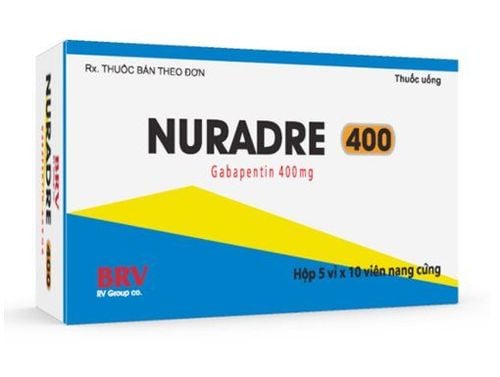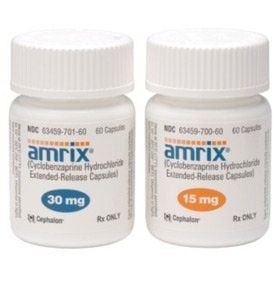This is an automatically translated article.
Thiocolchicoside is a muscle relaxant used to treat muscle spasms. Because of its mechanism of action as an anti-inflammatory and pain reliever, thiocolchicoside is often prescribed for people with chronic back pain, orthopedic and rheumatic disorders.
1. What is Thiocolchicoside?
Thiocolchicoside is a semi-synthetic derivative of Colchicine, a naturally occurring anti-inflammatory glycoside derived from the flower seeds of the plant, Superba gloriosa. This is a muscle relaxant with anti-inflammatory and pain-relieving effects. However, Thiocolchicoside should not be used by people who are prone to seizures. Thiocolchicoside's mechanism of action is to relax muscles through selective binding to the GABA-A receptor. The drug blocks muscle contractions by activating the GABA inhibitory motor pathway. In other words, Thiocolchicoside acts as a competitive GABA receptor antagonist and inhibits glycine receptors with similar potency to nicotinic acetylcholine receptors.Therefore, the drug Tthiocolchicoside is used in combination with glafenine and meprobamate to sedation for patients who need to conduct tests that need cooperation such as tomography, ultrasound.
In the treatment of painful muscle spasms, Thiocolchicoside relieves central muscle spasticity and reflex contractures, rheumatism and trauma. In addition, the drug Thiocolchicoside also reduces symptoms of stroke sequelae causing hemiplegia, Parkinson's disease and especially neurological disorder syndrome. Some other conditions that can be used with Thiocolchicoside are acute and chronic low back pain and sciatica, cervical - brachial neuralgia, persistent torticollis, pain after trauma and surgery.

Thuốc Thiocolchicoside có khả năng làm giảm các triệu chứng của bệnh Parkinson
2. What are the uses of Thiocolchicoside?
Because of its action on specific receptors of the nervous system in the body, Thiocolchicoside helps relieve pain in patients with a number of symptomatic musculoskeletal conditions, including:
Acute back pain or chronic; Pain after surgery; Muscle spasms; Ankylosing spondylitis ; Rheumatoid arthritis ; Arthropathy; Damage to the vertebrae; Traumatic injury; Neuritis; Persistent muscle spasms. In addition, like anti-inflammatory drugs combined with analgesic properties, this drug inhibits the blocking of cyclooxygenase, contributing to effective pain relief.
3. How to use Thiocolchicoside?
Thiocolchicoside capsules should be taken with or immediately after meals to avoid stomach upset. For parenteral preparations, the doctor prescribes Thiocolchicoside injection at the hospital.
If the condition has not improved, the doctor will adjust the high dose depending on the situation. Do not consume more or less than what is recommended. It is best to avoid stopping taking the medication on your own as well as skipping doses. Consult your doctor if an overdose is suspected.
It is necessary to inform the doctor about medical history and current medications before being prescribed Thiocolchicoside. Also, female patients should tell their doctor if they are pregnant, planning to become pregnant or breast-feeding before taking this medicine. Thiocolchicoside should only be used in adolescents and adults over 16 years of age.
4. What are the side effects of Thiocolchicoside?
Thiocolchicoside is only available on prescription. Dosage and side effects may vary from person to person.
Some of the most common side effects of Thiocolchicoside include drowsiness, stomach upset, bloating, nausea, and diarrhea. If you notice any serious symptoms such as itching, rash, dry mouth, yellowing of the eyes, sudden drop in blood pressure or heart palpitations, contact your doctor immediately.
Thiocolchicoside should not be used in patients with severe kidney disease, history of seizures, asthma, acute rhinitis or during pregnancy.

Trường hợp sủ dụng thuốc Thiocolchicoside xuất hiện triệu chứng vàng mắt cần liên hệ ngay với bác sĩ
5. What information should be noted when taking thiocolchicoside?
Patient Information Thiocolchicoside is a medication used for conditions associated with muscle pain. However, new evidence has shown that Thiocolchicoside is broken down in the body into a substance called M2, in sufficient amounts to affect the genetic material of cells. This leads to an abnormal number or arrangement of chromosomes, which reduces fertility in men and, if it occurs during pregnancy, can harm the developing baby. mom.
In theory, long-term exposure to thiocolchicoside may increase the risk of cancer, although there is currently no evidence for this. Therefore, to minimize the amount of M2 produced in the body and any associated risks, thiocolchicoside-containing medicines are currently only recommended for short-term use as an adjunct to other treatments. Another remedy for pain caused by persistent muscle spasms at disease sites such as the spine in adults and adolescents 16 years of age and older.
Never take medicine containing thiocolchicoside if you are pregnant or breastfeeding. Women of childbearing age must use highly effective contraception while taking these drugs.
Medicines containing thiocolchicoside are also available in formulations for topical application, but these drugs do not produce the same levels of M2 in the body and do not affect the genetic material of cells so they may be safer to take. .
Information for Physicians Thiocolchicoside for systemic use is recommended only as adjunctive treatment for acute spasticity of the spine in adults and adolescents 16 years of age and older. However, the drug is not recommended for the long-term treatment of chronic pain conditions.
The maximum recommended oral dose of thiocolchicoside is 8 mg every 12 hours; the duration of treatment should not exceed 7 consecutive days. When administered intramuscularly, the maximum dose should be 4 mg every 12 hours, for up to 5 days.
Patients being treated with systemic thiocolchicoside should be closely monitored at each follow-up visit as well as consider appropriate alternative therapies.
In summary, Thiocolchicoside is used to relax muscles and relieve pain caused by spasms of skeletal muscles. Because the drug works on centers in the brain and spinal cord to relieve muscle stiffness or spasms, Thiocolchicoside should only be used with a specialist indication. It is necessary to consult a doctor in case of unusual symptoms and consider the possibility of response to the drug during treatment.
Please dial HOTLINE for more information or register for an appointment HERE. Download MyVinmec app to make appointments faster and to manage your bookings easily.
References: medicoverhospitals.in, ema.europa.eu, go.drugbank.com, practo.com













